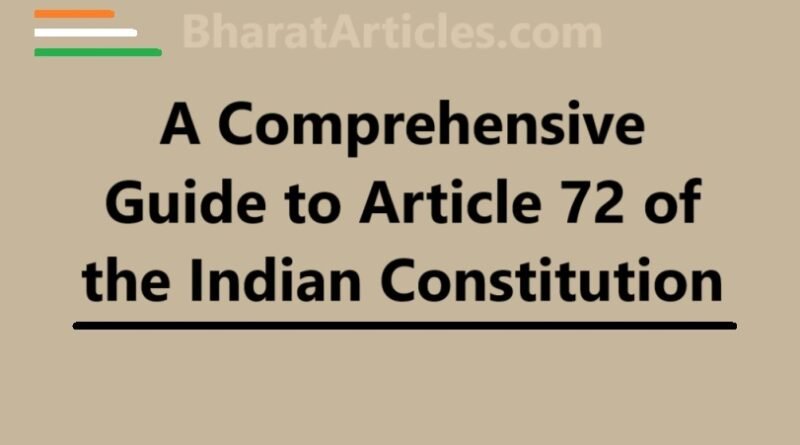A Comprehensive Guide to Article 72 of the Indian Constitution
Introduction
The Indian Constitution provides various powers to the President of India, including executive, legislative, financial, and judicial powers. One of the key judicial powers of the President is conferred under Article 72, which deals with the power to grant pardons and other forms of clemency. This article explores the provisions, significance, and implications of Article 72 in the Indian legal framework.
Understanding Article 72
Article 72 of the Indian Constitution empowers the President of India to grant pardons, reprieves, respites, or remissions of punishment in certain cases. The provision is as follows:
Text of Article 72: “The President shall have the power to grant pardons, reprieves, respites, or remissions of punishment or to suspend, remit, or commute the sentence of any person convicted of any offense— (a) in all cases where the punishment or sentence is by a Court Martial; (b) in all cases where the punishment or sentence is for an offense against any law relating to a matter to which the executive power of the Union extends; (c) in all cases where the sentence is a death sentence.”
Types of Clemency Powers Under Article 72
- Pardon: Completely absolves the individual of the crime and its associated punishment.
- Commutation: Reduces the severity of the sentence (e.g., death penalty to life imprisonment).
- Remission: Reduces the duration of the sentence without changing its nature.
- Respite: Reduces the sentence in specific cases, such as on medical or humanitarian grounds.
- Reprieve: Temporarily delays the execution of a sentence, especially death sentences.
Scope and Significance of Article 72
- Judicial Review: Although the President exercises these powers on the aid and advice of the Council of Ministers, the Supreme Court and High Courts can review the decision if there is malafide intent or procedural irregularity.
- Executive Discretion: The power is discretionary, meaning the President is not bound by judicial decisions but usually acts on the government’s advice.
- Humanitarian Consideration: The provision serves as a corrective measure to rectify any miscarriage of justice, showing the humane aspect of governance.
- Military and Death Sentence Cases: The special mention of court-martial and death sentences indicates the seriousness and gravity of such cases in the eyes of the Constitution.
Difference Between Article 72 and Article 161
While Article 72 grants clemency powers to the President, Article 161 provides similar powers to the Governor of a State. However, the Governor’s powers apply only to offenses under laws falling within the state’s jurisdiction, whereas the President’s powers extend to all laws under the Union’s purview.
Landmark Cases Related to Article 72
- Kehar Singh v. Union of India (1989): The Supreme Court held that the President’s power under Article 72 is subject to judicial review in cases of arbitrary or mala fide exercise.
- Maru Ram v. Union of India (1980): The Court ruled that the President must act on the advice of the Council of Ministers while exercising clemency powers.
- Shatrughan Chauhan v. Union of India (2014): This case emphasized that undue delay in deciding mercy petitions can be a valid ground for commuting a death sentence.
Challenges and Criticism
- Political Influence: The decision-making process may sometimes be influenced by political considerations rather than justice.
- Lack of Transparency: The criteria for granting clemency are not well-defined, leading to concerns about arbitrary decisions.
- Judicial Delays: Despite being an extraordinary remedy, clemency petitions often take years for resolution.
Conclusion
Article 72 plays a crucial role in the Indian justice system, allowing for a final appeal to the highest authority in the country. While it acts as a safeguard against miscarriage of justice, it also carries challenges that necessitate careful scrutiny and transparent decision-making. Strengthening the framework around the exercise of this power can enhance fairness and uphold the spirit of justice in India.

